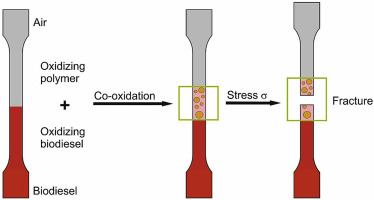Polymer Degradation and Stability ( IF 6.3 ) Pub Date : 2019-01-19 , DOI: 10.1016/j.polymdegradstab.2019.01.018 Maren Erdmann , Martin Böhning , Ute Niebergall

|
The physical and chemical effects of diesel and biodiesel fuels on two high-density polyethylene (PE-HD) types were investigated. Both semi-crystalline PE-HD are common thermoplastic materials for container and storage tank applications. Biodiesel, a composition of unsaturated fatty acid esters from renewable resources, was chosen as it is regarded a possible green alternative to fossil fuels. The study aims at identifying significant differences between biodiesel and conventional diesel fuels based on the differences in the chemical nature of the two.
The physical effects of the fuels on the polymer at first comprises the sorption behavior, i.e. kinetics and final equilibrium concentration. Not only are both fuels absorbed by the amorphous phase of the semi-crystalline PE-HD, they also induce a plasticization effect that modifies the molecular mobility and therefore also the characteristic yielding properties, manifest in the obtained stress-strain curves.
The chemical effects related to degradation phenomena is investigated by a long-term storage scenario using partially immersed tensile test specimens in diesel and biodiesel. We were able to confirm the proposed co-oxidation mechanism by Richaud et al. for polyethylene-unsaturated penetrant systems on a larger scale based on practical tensile tests. One of the investigated polyethylene grades subjected to tensile drawing showed a significant loss of plastic deformation and the onset of premature failure after 150 days of storage in biodiesel. Further biodiesel storage showed a systematically reduced elongation at break before necking. None of these effects were observed in diesel. Oxidation of fuels and polymer after progressing storage times were analyzed by the evolution of carbonyl species in FT-IR/ATR spectroscopy.
中文翻译:

生物柴油储存对高密度聚乙烯的物理和化学作用:共氧化的证据
研究了柴油和生物柴油燃料对两种高密度聚乙烯(PE-HD)类型的物理和化学作用。两种半结晶PE-HD都是用于容器和储罐应用的常见热塑性材料。选择了生物柴油,它是可再生资源中不饱和脂肪酸酯的组成,因为它被认为是化石燃料的一种绿色替代品。该研究旨在根据两者的化学性质差异,确定生物柴油与常规柴油之间的显着差异。
燃料对聚合物的物理作用首先包括吸附行为,即动力学和最终平衡浓度。不仅燃料被半结晶PE-HD的非晶相吸收,而且还引起增塑作用,这种增塑作用改变了分子的迁移率,因此也改变了特征屈服特性,这在所得的应力-应变曲线中得以体现。
通过将部分浸入的拉伸试验样品浸入柴油和生物柴油中的长期储存方案,研究了与降解现象相关的化学效应。我们能够证实Richaud等人提出的共氧化机理。基于实际的拉伸试验,可用于较大规模的聚乙烯-不饱和渗透剂体系。在生物柴油中储存150天后,其中一种进行了拉伸拉伸的聚乙烯等级显示出明显的塑性变形损失和过早失效的发生。进一步的生物柴油储存显示出颈缩之前断裂伸长率的系统降低。在柴油中没有观察到这些影响。通过FT-IR / ATR光谱中羰基种类的演变分析了储存时间延长后燃料和聚合物的氧化。











































 京公网安备 11010802027423号
京公网安备 11010802027423号